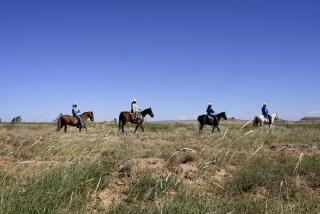Dukakis Leads Jackson in Arizona Vote
- Share via
PHOENIX — Massachusetts Gov. Michael S. Dukakis led the Rev. Jesse Jackson in Arizona’s Democratic caucuses Saturday and could wind up with 20 of the state’s 36 committed delegates.
Dukakis was getting strong support from moderate whites, while both he and Jackson were doing well with liberal whites and Latinos, incomplete returns showed. Most of the American Indian and black votes were going to Jackson.
The voting indicated that Dukakis could get about 48% of the vote statewide to Jackson’s 42%.
Gore Trailing
Tennessee Sen. Albert Gore Jr. was not expected to get more than 10% of the vote, meaning he would not qualify for any delegates.
Even though Jackson was running second, his showing was a strong one, more than doubling the 16% of the vote he received in 1984. Jackson was expected to get about 16 of the delegates.
Arizona also has five “super delegates” to the national convention, all uncommitted for now.
The caucuses were a low-key affair. With only 36 delegates at stake here, most of the Democratic candidates’ attention has been focused on Tuesday’s huge New York primary, with 255 delegates at stake.
Dukakis and Gore did not campaign here at all, and Jackson came once. Dukakis’ wife, Kitty, spent one day in the state.
Both Dukakis and Jackson had active phone banks, however, and state party officials said a large number of the party’s caucus-goers had been reached by both campaigns.
A poll published by the Arizona Republic on Saturday had showed Dukakis leading Jackson 48% to 23%, with Gore at 7%. But both Dukakis and Jackson camps predicted a close contest.
Turnout was projected at about 30,000 Democrats out of the 700,000 registered in the state.
In that sense, the Arizona caucuses were the classic political party event in which a small number of informed people with strong opinions on issues made the effort to cast ballots out of concern for the direction of their party.
Party Commitment
These included blacks, Latinos and Indians who do not want the party to abandon its longtime commitment to minorities, as well as union members and well-educated liberals who are wary of another four years with a Republican in the White House.
“We’re talking about very committed Democrats,” political consultant Rick DeGraw said.
Most of the votes were cast in Phoenix and Tucson, the two biggest population centers.
The Gore campaign targeted the more rural areas, but in some cases that required a caucus-goer to drive more than 50 miles to the polling place.
Some Democratic activists worried that turnout would be affected by the lack of publicity about the caucuses, a result of all the attention paid to the recent impeachment and removal of Republican Gov. Evan Mecham.
Still, Glenn Davis, executive director of the state Democratic Party, said he hoped the Arizona caucuses would offer a boost to the winner that would have an impact Tuesday in New York.
More to Read
Get the L.A. Times Politics newsletter
Deeply reported insights into legislation, politics and policy from Sacramento, Washington and beyond. In your inbox twice per week.
You may occasionally receive promotional content from the Los Angeles Times.










